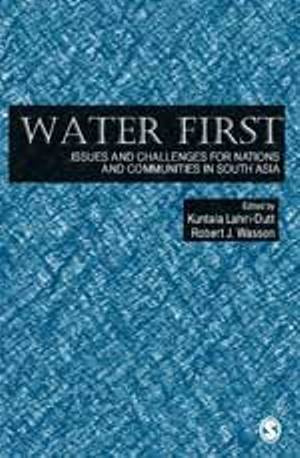World
Source South Asia Water & Sanitation News:Issue 8 (30 Sep 08)
Posted on 13 Oct, 2008 09:26 PM Since its foundation in 1968, the IRC International Water and Sanitation Centre (IRC) has facilitated the sharing, promotion and use of knowledge so that governments, professionals and organisations can better suppo
Since its foundation in 1968, the IRC International Water and Sanitation Centre (IRC) has facilitated the sharing, promotion and use of knowledge so that governments, professionals and organisations can better suppo
World Water Week 2008 : Recap
Posted on 09 Oct, 2008 09:23 AMThe World Water Week concluded at Stockholm on August 23rd. with 2400 scientists, leaders and various representatives from more than 100 countries. Action is crucial, stakes are high and time is running out, were the key messages coming from the World Water Week (August 17th - 23rd). The focal points throughout were sanitation and hygiene, climate, water management, ecosystems and business issues. Studies, reports, initiatives and announcements made during the week included: Water, Agriculture and Bioenergy: http://www.worldwaterweek.org/Downloads/2008/Water_Agriculture_Bioenergy.pdf Water Resource Management: http://www.worldwaterweek.org/Downloads/2008/Water_Resource_Management.pdf Climate and Water: http://www.worldwaterweek.org/Downloads/2008/Climate_and_Water.pdf Water Economics, Finance and the Private Sector: http://www.worldwaterweek.org/Downloads/2008/Economics_Finance_and_the_Private_Sector.pdf Ecosystems and Biodiversity: http://www.worldwaterweek.org/Downloads/2008/Ecosystems_and_Biodiversity.pdf Transboundary Waters: http://www.worldwaterweek.org/Downloads/2008/Transboundary_Waters.pdf Water in Asia: http://www.worldwaterweek.org/Downloads/2008/Water_in_Asia.pdf
"Small Towns in a Booming Economy"
Posted on 08 Oct, 2008 06:35 AMSunita Nadhamuni is CEO of Arghyam Trust in Bangalore/Bengaluru, (www.arghyam.org), which is the organisation that manages the India Water Portal.
Book shelf : "Water First: Issues and Challenges for Nations and Communities in South Asia" by Kuntala Lahiri-Dutt and Robert J Wasson
Posted on 29 Sep, 2008 10:11 AM This book brings together current knowledge and cutting edge interdisciplinary perspectives from renowned scholars on the histories, politi
This book brings together current knowledge and cutting edge interdisciplinary perspectives from renowned scholars on the histories, politi
Quick and easy: SODIS and Nimbu Pani for potable water
Posted on 26 Sep, 2008 05:57 AMHere is a slightly long and complex paper but the sum and substance of it seems to be that Solar Disinfection (SODIS) combined with Nimbu pani is excellent to reduce e-coli count and inactivate it substantially. Nimbu paani also serves as an indicator that the water has been SODISED.
Source South Asia Water & Sanitation News:Issue 7, September 2008
Posted on 22 Sep, 2008 01:36 PM Since its foundation in 1968, the IRC International Water and Sanitation Centre (IRC) has facilitated the sharing, promotion and use of knowledge so that governments, professionals and organisations can better suppo
Since its foundation in 1968, the IRC International Water and Sanitation Centre (IRC) has facilitated the sharing, promotion and use of knowledge so that governments, professionals and organisations can better suppo
The Coca-Cola company: "Replenish" report
Posted on 14 Sep, 2008 09:29 AM The Coca-Cola Company is committed to the good health and well being of communities around the world.
The Coca-Cola Company is committed to the good health and well being of communities around the world.
The sanitation crisis - Addressing challenges in India and globally
Posted on 11 Sep, 2008 11:14 PMOne in four girls does not complete primary school - compared to one in seven boys - and the lack of proper sanitation is partially to blame.
On the book shelf: Interlinking of Rivers in India, Issues and Concerns
Posted on 31 Aug, 2008 10:26 AM Key Features: Reviews the risks of inter-basin water transfers warns of critical disadvantages with India's proposed ILR plan offers viable less-risky solutions for water resource development. Inter-basin water transfers are complex human interventions on natural systems that can have profound adverse as well as beneficial social, economic and environmental implications. India's plan to interlink its rivers (ILR) and to transfer water may, according to one set of views, generate positive benefits through improved and expanded irrigation and may also contribute to flood and drought hazards mitigation for India, although the magnitudes are debatable. However, there are opposing views, in the context of India itself, that the interlinking plan is economically prohibitive, fraught with uncertainties, and has potential for disastrous and irreversible adverse after-effects. Water deficit can be reduced through improved water management without large scale engineering interventions. Moreover many of the rivers involved, particularly in the Himalayan component, are international and, therefore, the scheme has major implications for other riparians. Indeed, the planned transfer of water from the Ganges and Brahmaputra rivers will adversely impact Bangladesh socially, economically and environmentally---unless arrangements are made to maintain historical flows, which is unlikely to be feasible.
Key Features: Reviews the risks of inter-basin water transfers warns of critical disadvantages with India's proposed ILR plan offers viable less-risky solutions for water resource development. Inter-basin water transfers are complex human interventions on natural systems that can have profound adverse as well as beneficial social, economic and environmental implications. India's plan to interlink its rivers (ILR) and to transfer water may, according to one set of views, generate positive benefits through improved and expanded irrigation and may also contribute to flood and drought hazards mitigation for India, although the magnitudes are debatable. However, there are opposing views, in the context of India itself, that the interlinking plan is economically prohibitive, fraught with uncertainties, and has potential for disastrous and irreversible adverse after-effects. Water deficit can be reduced through improved water management without large scale engineering interventions. Moreover many of the rivers involved, particularly in the Himalayan component, are international and, therefore, the scheme has major implications for other riparians. Indeed, the planned transfer of water from the Ganges and Brahmaputra rivers will adversely impact Bangladesh socially, economically and environmentally---unless arrangements are made to maintain historical flows, which is unlikely to be feasible.